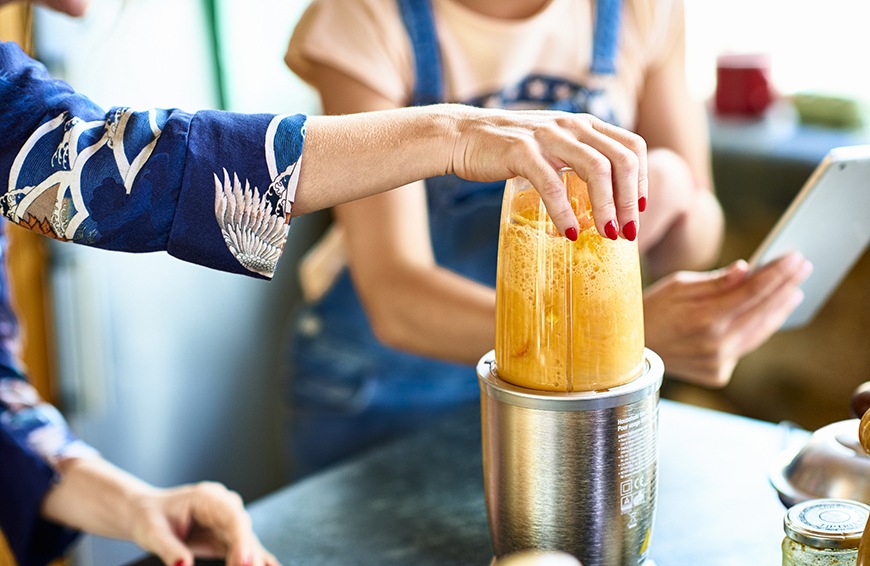6 Benefits of Peaches That Prove They’re Worth a Bite All Year-Round
Peaches were first grown in China way back in 6000 BC. China is still a top peach producer today, but they are also grown right here in the U.S., with New Jersey, California, South Carolina, and Georgia leading the charge as the top peach-producing states. In the summer, fresh peaches are easy to find in the produce section at the grocery store and farmers' market. But just because it's no longer peak peach season doesn't mean you have to go without. Head over to the frozen section at your local grocery store and you'll find frozen peaches ready to be added to your smoothies, oatmeal, desserts, and other dishes.
Peaches have a lot more to offer than just that summertime feeling (although that's definitely a big plus, IMO). Here, integrative and functional dietitian Nour Zibdeh, MS, RDN, CLT, explains what exactly it is about peaches that makes them so good for you.
What nutrients are found in peaches?
Below is the nutritional information for one medium-sized peach, according to the U.S. Department of Agriculture:
Protein: 1 g
Carbohydrates: 14 g
Fiber: 2 g
Calcium: 9 mg
Magnesium: 13 g
Phosphorus: 30 mg
Potassium: 285 mg
Folate: 6 µg
Choline: 9 µg
Vitamin A: 489 IU
Carotene, beta: 243 µg
Lutein + zeaxanthin: 136 µg
Vitamin E: 1 mg
Vitamin K: 4 µg

{{post.sponsorText}}
In addition to this long resume of benefits, peaches are also full of antioxidants, compounds that protect the body from free radicals, helping to prevent chronic inflammation. All of these nutrients benefit the body in many ways. Keep reading to see exactly how.
What are the benefits of peaches?
1. Peaches are a good source of vitamin C.
Sorry oranges, you aren't the only fruit in town good for this. One medium-sized peach has 10 milligrams of the important antioxidant (about 13 percent of your recommended daily intake). "This is good for the immune system, reducing free radical oxidative damage, and reducing the risk for chronic diseases," Zibdeh says.
2. They're full of vitamin A.
Zibdeh points to peaches' high vitamin A content as another reason why the fruit is a healthy win. "Vitamin A is important for healthy skin and eyes, reducing inflammation, and boosting the immune system," she says. "It's also needed for building a healthy gut lining which is going to help fend off pathogens that we might encounter in our food or environment." Carrots tend to get all the attention when it comes to vitamin A, but as Zibdeh points out, it's far from the only way to get your fill.
3. They're fibrous.
Fiber is crucial for good gut health, but if you want to get as much fiber as you can from peaches, the key is to eat the whole fruit, not just enjoy its juice. One medium-sized peach has 3 grams of fiber—including the skin, so go ahead and eat that too!
4. Peaches have potassium.
"Potassium is an important mineral that helps lower blood pressure, regulate blood sugar, and balance fluids in the body," Zibdeh says. There's 285 mg of the stuff in one medium-sized peach—about 11 percent of what most adult women should be eating per day. "Deficiency in potassium can cause muscle cramps," she adds, making the point that it's not a bad idea to enjoy one as a post-workout snack.
5. They contain calcium.
One medium-sized peach has nine milligrams of calcium (a small amount, but still there!), which contributes to strong bones and teeth. So if you snack on yogurt on the reg with bone health in mind, add some peaches on top to get even more of this important benefit.
6. Peaches are hydrating.
Peaches are between 85 and 89 percent water, which means they're a great way to stay hydrated—especially when it's hot out. While nothing can replace good 'ol H20, the fruit is a good addition to what's in your water bottle.
Negative qualities of peaches
While peaches are full of nutritional benefits, Zibdeh says it is important to be mindful of the sugar content, which is about 13 grams per medium fruit. "While peaches may have few extra grams of sugar compared to other fruit, to put it into perspective, it’s much less sugar than you would get from soda, juice, or a few small cookie," she says.
If you are sensitive to FODMAP foods, peaches might not agree with you. "Peaches contain a type of natural sugar that feeds gut bacteria, and if you have a healthy gut and gut flora, that’s typically a good thing. However, if you have digestive discomforts like stomach pain, bloating, gas, belching, diarrhea, or constipation or if you have been diagnosed with IBS or SIBO, you may not tolerate peaches," Zibdeh explains. "They are often in the 'avoid' lists in digestive healing diets like the low FODMAPs diet." If you notice stomach upset after eating peaches, Zibdeh suggests consulting with a digestive health dietitian or a doctor to see what's going on.
3 delicious ways to eat peaches

1. Griddled peaches with cashew cream
Charring and caramelizing the peach flesh and topping it off with a smooth, nutty cream is a completely new way to enjoy the summer fruit. This recipe also calls for raspberries and oranges, which ups the antioxidant content while adding extra flavor.

2. Ginger peach smoothie
Enjoy a peachy treat on the go—without getting your hands all sticky—by working it right into your smoothie. Also featuring ginger, turmeric, and black pepper, this morning beverage helps reduce inflammation.
3. Honey peach vegan ice cream
Blend peaches with honey and non-dairy yogurt, freeze it for a couple of hours, and transform it into a creamy, nutrient-rich vegan ice cream! And yes, it tastes like pure magic, too.
Whether you want to use your peaches to make one of the above recipes, something else, or just want to bite into one as-is, it helps knowing how to select the perfect peach at the store. Look for peaches that are firm and eat them when the texture starts to soften a little. While many people pass up bruised peaches, they are 100 percent okay to eat and choosing these often neglected peaches will help cut down on food waste.
Once you get your peaches home, store them in a paper bag in the refrigerator away from other fruits. This is because peaches produce ethylene, which can cause the other fruits nearby to ripen quicker than you may want. You can also buy frozen peaches and store them in the freezer.
As you can see, eating peaches year-round will benefit your body in a whole slew of ways. Why wait until summer? A peachy snack may be just what you need to brighten up your day.
Oh hi! You look like someone who loves free workouts, discounts for cutting-edge wellness brands, and exclusive Well+Good content. Sign up for Well+, our online community of wellness insiders, and unlock your rewards instantly.
Loading More Posts...